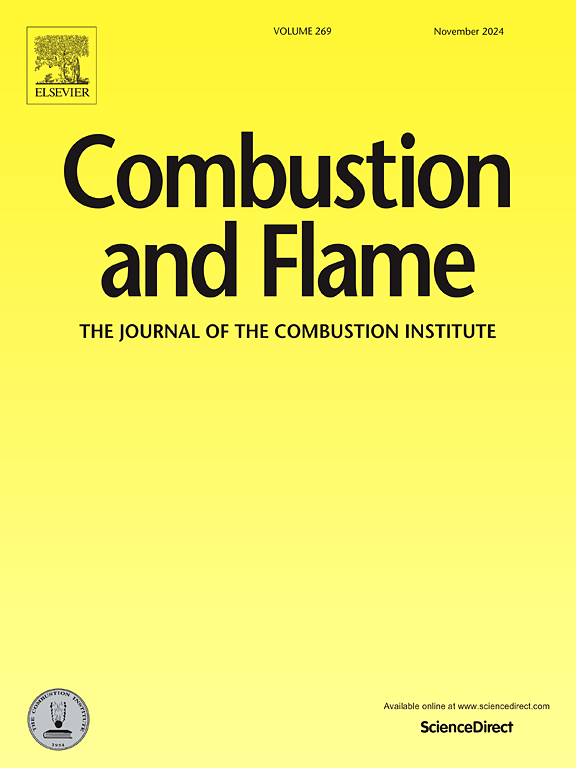氢过氧甲基酯自由基的 β 分裂反应和甲基酯过氧自由基的协同 HO2 消除反应的动力学研究:对甲酯低温燃烧模型的影响
IF 5.8
2区 工程技术
Q2 ENERGY & FUELS
引用次数: 0
摘要
氢过氧甲基酯自由基(甲基酯中的 -QOOH 自由基)的 β 分裂反应和甲基酯过氧自由基(甲基酯中的 ROO-)的协同 HO2- 消除反应是在甲基酯低温燃烧过程中对终止链式反应起关键作用的两类反应。这些反应也是生物柴油中出现负温度系数行为和点火抑制的主要原因。虽然计算出的小型甲酯中此类反应的速率常数有限,但大型甲酯模型中的速率常数通常是根据烷烃中类似的烷基反应来近似计算的。在本研究中,利用等渗反应方法修正了低级 B3LYP 方法计算出的能障和高压极限速率常数。这样做的目的是为了接近用高级 G4 方法得到的结果。根据新形成的 CC 键在烯烃酯产物中的位置以及自由基在反应物上的位置,将 β 裂解类进一步分为 6 个子类;根据新形成的 CC 键在烯烃酯产物中的位置以及 -OOH 基团和被消除的 H 原子所在的碳位点,将协同消除类分为 4 个子类。通过平均每个亚类中的速率常数,建立了亚类的高压极限和压力依赖性速率规则。值得注意的是,我们的速率常数与大甲酯模型中报告的速率常数之间存在很大差异,后者的速率常数是根据烷烃中类似的烷基反应近似得出的。这说明在生物柴油模型中直接应用烷基反应速率常数存在很大的不确定性。因此,通过纳入本研究得出的速率规则,建立了辛酸甲酯/乙醇的低温氧化模型,该模型可在喷射搅拌反应器的条件下有效再现实验数据。本文章由计算机程序翻译,如有差异,请以英文原文为准。
Kinetic investigations on the β-scission reactions of hydroperoxy methyl-ester radicals and the concerted HO2 elimination reactions of methyl-ester peroxy radicals: Implication for low-temperature combustion modeling of methyl esters
The β-scission reactions of hydroperoxy methyl-ester radicals (•QOOH radicals in methyl esters) and the concerted HO2• elimination reactions of methyl-ester peroxy radicals (ROO• in methyl esters) are two reaction classes that play a crucial role in terminating the chain reaction during the low-temperature combustion of methyl esters. These reactions are also key contributors to the negative temperature coefficient behavior and ignition inhibition observed in biodiesel. Although limited rate constants for these classes in small methyl esters have been calculated, those in larger methyl ester models are frequently approximated based on analogous alkyl reactions in alkanes. In this study, the isodesmic reaction method is utilized to correct the energy barriers and high-pressure-limit rate constants calculated at the low-level B3LYP method. The objective is to approximate the results obtained with the high-level G4 method. The β-scission class is further categorized into 6 subclasses based on the position of the newly formed C![]() C bond in the olefin ester product and the location of the radical on the reactant and the concerted elimination class is divided into 4 subclasses based on the position of the newly formed C
C bond in the olefin ester product and the location of the radical on the reactant and the concerted elimination class is divided into 4 subclasses based on the position of the newly formed C![]() C bond in the olefin ester product and the carbon sites where the -OOH group and the eliminated H atom are situated. High-pressure-limit and pressure-dependent rate rules for subclasses are established by averaging rate constants within each subclass. Notably, substantial disparities are observed between our rate constants and those reported in models for large methyl esters, where rate constants are approximated from analogous alkyl reactions in alkanes. This underscores the significant uncertainty associated with the direct application of alkyl reaction rate constants in biodiesel models. Consequently, a low-temperature oxidation model of methyl octanoate/ethanol is developed through the incorporation of the rate rules derived in this study, resulting in a model that effectively reproduces experimental data within the conditions of a jet-stirred reactor.
C bond in the olefin ester product and the carbon sites where the -OOH group and the eliminated H atom are situated. High-pressure-limit and pressure-dependent rate rules for subclasses are established by averaging rate constants within each subclass. Notably, substantial disparities are observed between our rate constants and those reported in models for large methyl esters, where rate constants are approximated from analogous alkyl reactions in alkanes. This underscores the significant uncertainty associated with the direct application of alkyl reaction rate constants in biodiesel models. Consequently, a low-temperature oxidation model of methyl octanoate/ethanol is developed through the incorporation of the rate rules derived in this study, resulting in a model that effectively reproduces experimental data within the conditions of a jet-stirred reactor.
求助全文
通过发布文献求助,成功后即可免费获取论文全文。
去求助
来源期刊

Combustion and Flame
工程技术-工程:化工
CiteScore
9.50
自引率
20.50%
发文量
631
审稿时长
3.8 months
期刊介绍:
The mission of the journal is to publish high quality work from experimental, theoretical, and computational investigations on the fundamentals of combustion phenomena and closely allied matters. While submissions in all pertinent areas are welcomed, past and recent focus of the journal has been on:
Development and validation of reaction kinetics, reduction of reaction mechanisms and modeling of combustion systems, including:
Conventional, alternative and surrogate fuels;
Pollutants;
Particulate and aerosol formation and abatement;
Heterogeneous processes.
Experimental, theoretical, and computational studies of laminar and turbulent combustion phenomena, including:
Premixed and non-premixed flames;
Ignition and extinction phenomena;
Flame propagation;
Flame structure;
Instabilities and swirl;
Flame spread;
Multi-phase reactants.
Advances in diagnostic and computational methods in combustion, including:
Measurement and simulation of scalar and vector properties;
Novel techniques;
State-of-the art applications.
Fundamental investigations of combustion technologies and systems, including:
Internal combustion engines;
Gas turbines;
Small- and large-scale stationary combustion and power generation;
Catalytic combustion;
Combustion synthesis;
Combustion under extreme conditions;
New concepts.
 求助内容:
求助内容: 应助结果提醒方式:
应助结果提醒方式:


